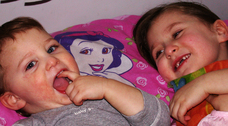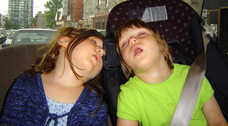Basic Research

The Attention Behaviour and Sleep (ABS) Laboratory studies the many aspects of sleep, attention, behaviour, emotion, and learning/memory from many different perspectives: cognitive, clinical, developmental, and neuroscientific. The lab observes behaviours, infers clinical relevance, and measures the developmental changes and underlying physiological mechanisms associated with sleep. Its primary concern is to collect ecologically valid data using robust experimental designs.
Sleep and Attention Study
The interplay between sleep regulation, neurobehavioural systems, and genetic mechanisms in children with Attention -Deficit Hyperactivity Disorder (ADHD)
Funded by: Canadian Institutes of Health Research (CIHR)
Leader: Dr. Reut Gruber
The Sleep and Attention study examines the effects of sleep on daytime attention and behaviour. Experimental laboratory-based studies and clinical observations have shown that insufficient and poor-quality sleep result in ADHD-like symptoms, including behavioural deregulation and poor neurocognitive functioning.
The association between sleep and neurobehavioral functioning in children with ADHD and breathing problems is well-documented, but there is little information regarding the association between sleep, daytime arousal, and neurobehavioral functioning in children with ADHD. The lab's goal with this project is to determine what aspects of neurobehavioural function are affected by sleep in order to develop appropriate and effective interventions to improve waking function by means of sleep modification.
Genetic mechanisms associated with sleep and arousal
Early studies show preliminary support for the involvement of catecholaminergic mechanisms in the regulation of sleep/arousal, cognition, and psychopathology. The lab has demonstrated a genetic link between ADHD and sleep continuity . We are interested in extending this line of investigation and expect to contribute to the knowledge regarding sleep in ADHD and support the development of individualized, genotype-specific sleep regimens.

Sleep to Remember Study
Sleep to remember: sleep-dependent learning and memory in children and adolescents
Funded by: Natural Sciences and Engineering Research Council of Canada (NSERC)
Leader: Dr. Reut Gruber
The Sleep to Remember study aims to investigate the interaction between sleep and learning, particularly how sleep restriction affects memory in children, adolescents, and adults. This study's results will offer important insights into the neurobehavioral underpinnings of learning-memory throughout development.
Clinical Research
The ABS lab is interested in the empirical treatment of sleep disorders in children and their families. The lab has a specific interest in working with children suffering from Attention-Deficit Hyperactivity Disorder (ADHD).
The ABS lab employs objective measures to document and diagnose sleep problems, as well as intervention tools to research empirically effective treatments for pediatric sleep problems including light therapy, melatonin therapy, and chronotherapy. To measure the effectiveness of such treatment, the lab employs the same tools used for diagnosis (e.g., actigraphy) and objective assessment (e.g. of neuropsychological functioning) to document changes in daytime activities in the domains of impairment (e.g. of attentional functioning) that might be affected by a sleep disorder.
The ABS lab also studies how goal attainment plans improve sleep quality in children with ADHD and help them get to sleep more easily.
Healthy Eating in Childhood
Funded by: Fonds de Recherche en Sante de Quebec (FRSQ)
Leaders: Drs. Reut Gruber, Bärbel Knäuper, Lauette Dubé, and Lesley Fellows.

As childhood obesity is increasing in our society, it is important to find a way to promote healthy eating in children. To do this, we must first improve our understanding of how children decide what food they eat and how best to change their eating habits. The Healthy Eating in Childhood study is investigating how children aged 5-7 and their mothers make decisions about eating. It is part of an ongoing collaboration, known as Brain to Society link, which aims to analyze and prevent obesity and other non-communicable chronic diseases. Participant testing and data collection takes place at the ABS lab.
Community-based participatory research
Community-based participatory research (CBPR) is an approach to scientific research that differs from traditional research by involving the community in the research process. Members of the community in which the research is being conducted take part in decision-making and help design and guide the implementation of the research findings.
In the CIHR-funded knowledge translation project entitled Sleep for Success, the ABS lab, in collaboration with he Riverside School Board, is using CBPR to apply the knowledge gained from sleep research to make a positive impact on the health and learning capacity of young people. The lab is developing the “Sleep for Success” program to increase total sleep and encourage healthy sleep habits in children, youth, and adults. This project will serve as a model that can be applied throughout Canada.
Sleep for Success Study
Sustained improvement of youth's health and learning capacity by rapid translation and dissemination of sleep research through school-board partnership
Funded by: Canadian Institutes of Health Research (CIHR)
Leader: Dr. Reut Gruber

Sleep for Success (SFS) is a joint initiative led by Gail Sommerville between Reut Gruber and the Riverside School Board. It aims to promote balanced lifestyles by integrating sleep education into the existing health curriculum. By stressing the interplay between sleep, diet, and physical activity, the program promotes behaviours that will lead to a lifelong commitment to healthy living.
The promotion of balanced lifestyles requires action across students’ daily environments including the school, the home, and the community. Sleep for Success therefore seeks to target not only students but their immediate environments and the most influential persons therein including parents, teachers, and school administrators. Specific literature, self-assessment materials, and online activities target these populations in a fun and interactive way. Evidence supporting this approach has been produced through focus groups held in the Riverside School Board and in other research contexts.
As 60-70% of Canadian students are shown to be extremely fatigued when they arrive at school, the implementation of such a program can have incredible positive effects for a school board and surrounding community.
The Sleep Squad
In response to the Sleep for Success program, James Stadnyk, teacher at Harold Napper School in Montreal, asked his grade 4 class to produce a video called The Sleep Squad.




